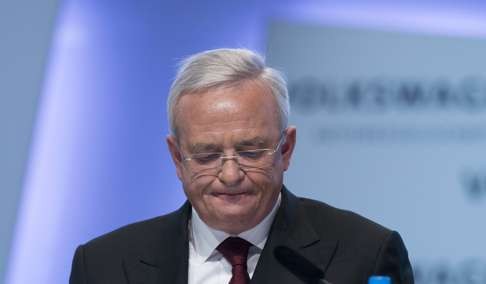From VW to HSBC, there’s a simple reason why so many CEOs fail to spot rogue behaviour
Information overload is making us oblivious to what’s often in plain sight

In the wake of practically every corporate or political crisis two questions are asked: First, was the person at the top aware of the problem and second, if so, what did they do about it?
The person at the top is key because there was a time when the “buck stops here” principal was thought to prevail. In other words someone was prepared to assume ultimate responsibility.
Nowadays the great panjandrums who run the world’s biggest companies get visibly agitated when asked to explain why things occurred on their watch. A case in point was the response of Stuart Gulliver, HSBC’s chief, when he was hauled before a British parliamentary committee looking into the banking crisis. Gulliver argued that he could not be held responsible for everything that went on in his bank: “Can I know what everyone of 257,000 people is doing?” he asked, concluding, “Cleary I can’t”.
More specifically questions were asked about whether Martin Winterkorn, the former Chief Executive of Volkswagen, was aware of an email dated May 24 2014, that specified “irregularities” with US emissions tests for two VW diesel vehicles. This memo was part of what VW described as Winterkorn’s “extensive weekend email”; one of the reasons proffered for why he may have overlooked it. Other internal documents, that subsequently came to light, suggest that VW went to some efforts to cover its tracks as the vehicle testing scandal mushroomed.
Responsibility is being dodged because those at the top insist they are suffering from information overload. This affects everyone, as the days are long gone when information distribution was more restricted and far lower in volume, consisting mainly of phone calls, possibly faxes and telegrams and big piles of documents. We are now bombarded by emails and other electronic messaging which, in theory, is more convenient and efficient but in practise may be producing a volume of information that is too vast to absorb.

There is a thin line between what those at the top need to know and what they are capable of knowing. However and understandably those at the top rarely get the benefit of the doubt when the brown stuff hits the fan and questions are asked about why nothing was done on the basis of previous information.
Why, for example did the Belgium authorities seemingly ignore specific warnings from Turkey about the terrorists responsible for the recent Brussels airport and subway atrocities? Did US President George W Bush read the 2001 security briefing warning about Osama Bin Laden’s determination to launch a direct attack on the American homeland, an attack realised in the 9/11 events?
It is always easier with hindsight to pontificate on what should or should not have been done. But, in this case, for example, was the Central Intelligence Agency warning sufficiently specific to provide a basis for action?
And what happens when more junior officials deliberately withhold information from their bosses? Tidjane Thiam, the relatively new broom at the top of Credit Suisse, says that staff in his bank’s market’s division deliberately withheld information about risky bets. No doubt his anger is genuine but there are questions to be asked about whether more probing questions should have been asked by the bank.
In almost all instances of vital information not being acted on in a timely fashion there is evidence that the information was sitting there waiting to be read but either as a result of incompetence, arrogance or straightforward neglect that information lay dormant.
The excuse of information overload is plausible but it seems to be part of that dreaded syndrome where people complain of being too busy to do this or that. The reality is not that they are busy but incapable of organising and prioritising their work. It may be a bit of a cliché but, in my experience, it sure as hell is the case that if you want to get something done, ask a genuinely busy person to do it.
There are many excuses for ignoring information or failing to take account of it but most of them come down to poor organisation. Just because we all suffer from information overload does not mean throwing up your hands and declaring, “I give up”.
On the contrary this proliferation of information is useful but will only be valuable to those who succeed in sorting out their priorities.
Sometimes there are good reasons why the person at the top is not informed of some vital matter but the health of all organisations rests on the idea that the buck stops somewhere. Life is not fair, so there will inevitably be a degree of unfairness when bosses are compelled to fall on their swords for events beyond their control. Yet fall they must because information overload is no excuse for ducking responsibility.